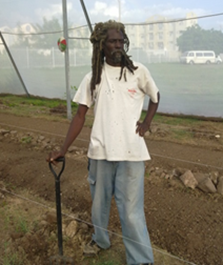"Pass the rake nuh please?" said Winston Bowen, one of the participants of the USAID/Productivity Empowerment Project (PEP), a two-year program designed to create a community owned and operated agro-enterprise in Trench Town, Jamaica.

Winston and his colleagues prepared the planting beds inside the newly constructed greenhouse that was filled with cherry tomatoes to be sold throughout Kingston. "I have been a farmer all of my life, and all I needed was the opportunity to expand my farming capabilities," he said.
Trench Town, like many communities in Jamaica, has been affected by decades of politically motivated crime and violence, leading to broken families, despair, and crippling poverty. However, due to a focused and cooperative effort by community organizations, the last six years have shown a dramatic decline in Trench Town's homicide rate. In order to maintain this level of peace, the community must engage in sustainable economic interventions to build the capacity of its residents and give them a sense of hope.
The community, famous for Reggae Music and Bob Marley, now has the real prospect of being known for its contribution to Jamaica's food security as well. While Jamaica has the ideal climate for agriculture, it currently imports over $1 billion in food annually. Individuals at the base of the economic ladder have suffered most from the high cost of imported food. PEP, from a local level, will have a positive impact on both nutrition and employment in Trench Town. However, from a macro perspective, it will contribute toward lowering food imports, building a more favorable balance of payment status, and attaining greater recognition by Jamaicans for consuming locally produced goods.
With funding made available from the USAID Development Grants Program (DGP), the primary objective of PEP is to develop a sustainable, replicable, economic model using the principles of urban agriculture. In July 2012, USAID granted funds to the Agency for Inner City Renewal (AIR), a Trench Town non-governmental organization that focuses on using social entrepreneurship for community transformation. At the conclusion of PEP, there will be three newly constructed greenhouse farms; twenty-one trained and certified community members in greenhouse farming; entrepreneurship, governance, and quality management; a registered cooperative with four full-time staff; and a functioning Board of Directors.
In November 2013, these community members participated in a ceremony celebrating the completion of their training under PEP. This was one event organized as part of the first Trench Town Trade and Investment Fair, held in Emancipation Park, St. Andrew.
PEP has also made great strides toward empowering women from the community in the area of entrepreneurship. "The PEP project greatly encouraged me to think about starting my own business," said Crystal Nobel, a 22 year-old woman who participated in the training. "It has also helped me to understand the importance of managing my personal time better." In addition, PEP signed an agreement with its first customer, "The Family Garden," to purchase cherry tomatoes on a contractual basis. Through a rigorous interview process, AIR selected Tashanna Walker, another graduate from the program, as the greenhouse manager.







Comment
Make a general inquiry or suggest an improvement.